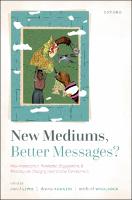New Mediums, Better Messages?
How Innovations in Translation, Engagement, and Advocacy are Changing International Development
Contributor(s)
Lewis, David (editor)
Rodgers, Dennis (editor)
Woolcock, Michael (editor)
Language
EnglishAbstract
The notion of development influences and is influenced by all aspects of human life. Social science is but one representational option among many for conveying the myriad ways in which development is conceived, encountered, experienced, justified, courted, and/or resisted by different groups at particular times and places. This wide-ranging collection from a diverse group of academic and non-academic authors engages with the broad field of development through twelve chapters that deal with music, theatre, fiction, photography, festivals, computer games, the arts, blogging, and other media. It explores three broad areas of alternative forms of knowledge about development, organized around the three themes of ‘translation’, ‘advocacy’, and ‘engagement’. The first of these is concerned with how popular representations of development can successfully compete with and complement formal social scientific representations; the second relates to the politics of popular representations of development, and the way that popular productions shape debates; and the third asks whether popular representations of development can generate alternative critiques that allow for the articulation of views that would be unacceptable to more orthodox means.
Keywords
international development, popular representations of development, culture, translation, advocacy, arts and international development, media and development, development studies, festivals, music, theatre, fiction, photography, computer games, blogging, politics of representation, decolonizing knowledgeDOI
10.1093/oso/9780198858751.001.0001ISBN
9780198858751, 9780198858768Publisher
Oxford University PressPublisher website
https://global.oup.com/Publication date and place
Oxford, 2022Grantor
Classification
Economics
Development economics and emerging economies
The Arts


 Download
Download Web Shop
Web Shop